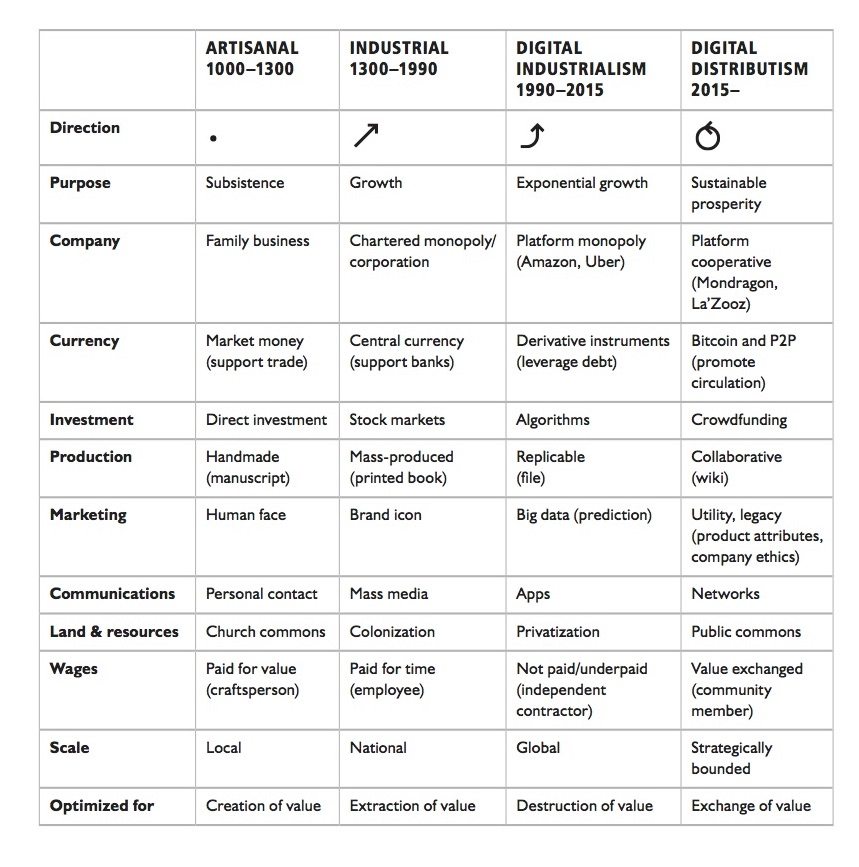To use the metaphor of our era, we are running an extractive, growth-driven economic operating system that has reached the limits of its ability to serve anyone, rich or poor, human or corporate. Moreover, we’re running it on super computers and digital networks that accelerate and amplify all its effects. Growth is the single, uncontested, core command of the digital economy… An operating system designed by 13th century Moorish accountants looking for a way to preserve the aristocracy of Europe has worked as promised. It turned the marketplace into one giant debtors’ prison. It is not only unfit for the needs of a 21st century digital society; central currency is the core mechanism of the growth trap.
Douglas Rushkoff, Throwing Rocks at the Google Bus
To be alive in 2017 is to be living through a raging, roiling argument about money: how it’s generated and how it will be distributed in the 21st century. Money dominates the changing politics and economics of the western hemisphere. Whether jobs, free trade, taxes, student debt, housing prices, AI-based automation, wealth disparities, educational funding or any of dozens of other headline-topics, how society will create and share value and resources sits at the forefront of our current moment.
Many people sense that something has gone terribly wrong.
In this Integral Life exclusive, renown media theorist and author Douglas Rushkoff argues that the central assumption of our economic lives — that further economic growth will create continually rising prosperity for all — is broken.
Taking us on a whirlwind tour from the bleeding edge of Google to the dusty streets of medieval Europe, Doug charts four cycles of capitalism over the past millennia, arguing that we’re living through the dying remnants of what he calls “digital industrialism.”

The core command of industrialism (and its digital variants, found in the likes of Amazon and Uber) is to extract value from everything within and around it–labor, competitors, communities, the environment, the stock market, the government–and plow that value into a form of growing “wealth obesity” for the rich.
And yet, as he points out, growth at any cost no longer works, running headlong into fundamental constraints and contradictions: the world’s resources are limited, people can’t eat software, and demand for products can only be as strong as are underlying jobs and income.
It’s against this backdrop that something new is emerging: from alternative currencies and open source platforms to economic cooperatives and benefit corporations, Doug sees the rise of a new “digital distributism” that just might evolve economic life to one of a just, sustainable prosperity for the 21st century.
Become a member today to listen to this premium podcast and support the global emergence of Integral consciousness
Membership benefits include:
Premium Content
Receive full access to weekly conversations hosted by leading thinkers

Journal Library
Receive full access to the growing Journal of Integral Theory & Practice library

Live Experiences
Stay connected by participating in Integral Life live events and discussions
Courses & Products
Get unlimited 20% discount off all products and courses from our friends and partners

Free Bonus Gifts
Download The Integral Vision eBook by Ken Wilber (worth $19 on Amazon) & The Ken Wilber Biography Series

Support of the movement
Support our mission of educating and spreading integral consciousness that is more critical than at any time in its history
About Douglas Rushkoff
Douglas Rushkoff is a writer, documentarian, and lecturer whose work focuses on human autonomy in a digital age. He is the author of fifteen bestselling books on media, technology, and society, including Program or Be Programmed, Present Shock, and Throwing Rocks at the Google Bus. He has made such award-winning PBS Frontline documentaries as Generation Like, Merchants of Cool, and The Persuaders, and is the author of graphic novels including Testamentand Aleister & Adolf.
About Robb Smith
Robb Smith is a leading thinker on the Transformation Age and the global Integral movement. He is the creator of the augmented leadership platform Context, co-founder and CEO of Integral Life and founder of the Institute of Applied Metatheory.

